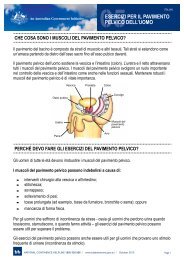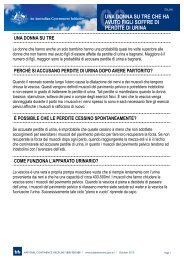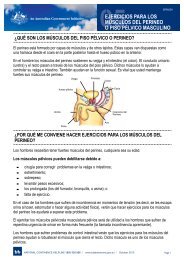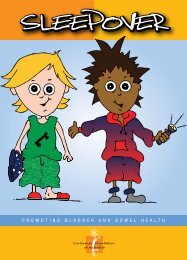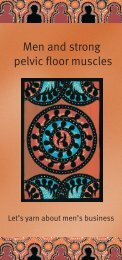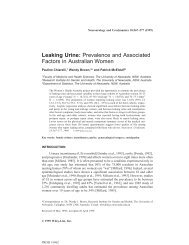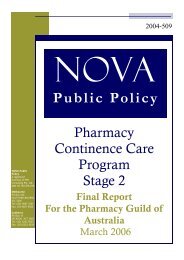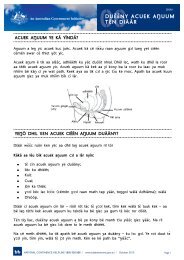Continence Tools for Residential Aged Care - Bladder and Bowel ...
Continence Tools for Residential Aged Care - Bladder and Bowel ...
Continence Tools for Residential Aged Care - Bladder and Bowel ...
Create successful ePaper yourself
Turn your PDF publications into a flip-book with our unique Google optimized e-Paper software.
16<br />
The <strong>Continence</strong> Assessment Form <strong>and</strong> <strong>Care</strong> Plan (cont’d)<br />
SECTION C: Nutrition (fluid & diet)<br />
Aim <strong>for</strong> the resident to have 5-10 cups of fluid per day<br />
unless otherwise indicated <strong>and</strong> limit known bladder<br />
irritants (i.e. coffee, alcohol). Aim <strong>for</strong> the resident to have<br />
30gm of dietary fibre per day unless otherwise indicated.<br />
Assessment cue Rationale & care options<br />
Does the resident drink<br />
an adequate amount<br />
of fluid to maintain<br />
hydration <strong>and</strong> healthy<br />
bladder <strong>and</strong> bowel<br />
function (Refer to Three<br />
Day <strong>Bladder</strong> Chart &<br />
check colour of urine)?<br />
Does the resident eat<br />
an adequate amount<br />
of food with fibrous<br />
content to maintain<br />
healthy bladder <strong>and</strong><br />
bowel function (Refer to<br />
nutritional assessment)?<br />
Inadequate fluid intake can result in urinary frequency, urgency <strong>and</strong> urge incontinence<br />
because it may lead to either a UTI or to urine that is highly concentrated <strong>and</strong> irritative to<br />
the bladder. It may also result in the resident becoming constipated.<br />
Most people rely on thirst as an indication of the need to drink- older people are at<br />
risk of experiencing an impaired thirst mechanism, putting them at risk of dehydration.<br />
It is recommended that at least 1.5 litres of fluid in 24 hours (approx 5-10 cups per<br />
day) is required <strong>for</strong> bladder <strong>and</strong> bowel health. Some medical conditions or side effects<br />
of medications can result in people drinking excessive amounts of fluid which can<br />
contribute to increased urinary symptoms. Alternatively, some people associate drinking<br />
fluids with their urinary incontinence, <strong>and</strong> avoid drinking, leading to a deterioration of<br />
their symptoms.<br />
Encourage or assist the resident to have their preferred drinks regularly. Allow adequate<br />
time <strong>for</strong> resident to consume all of their drinks, <strong>and</strong>/or encourage relatives to assist if<br />
available. Offer decaffeinated drinks if caffeine is known to irritate the resident’s urinary<br />
symptoms. Monitor resident’s behaviour <strong>for</strong> signs of excessive drinking (more than<br />
2.5 L per 24 hours) or avoiding drinks. Report to RN, CNA or GP if indicated who may<br />
recommend that the resident’s fluid intake be recorded (over a 3-5 day period).<br />
Vegetables, fruit <strong>and</strong> many cereals contain fibre. Fibre is important to draw water into<br />
the faeces in the large intestine, enabling passage of <strong>for</strong>med, easy to pass stools. It also<br />
assists peristalsis- the muscular movement of the bowel that moves the faeces along.<br />
Offer the resident a variety of fibre sources. Some residents may prefer small meals<br />
more regularly.<br />
If the resident wears dentures, check them regularly <strong>for</strong> correct fit, <strong>and</strong> ensure they are in<br />
at meal times.<br />
You may like to refer the resident to a dietician who will be able to recommend foods<br />
high in fibre.<br />
Keep in mind that some residents have difficulty in swallowing <strong>and</strong> may need additional<br />
supplements <strong>and</strong>/or advice from a speech therapist.



